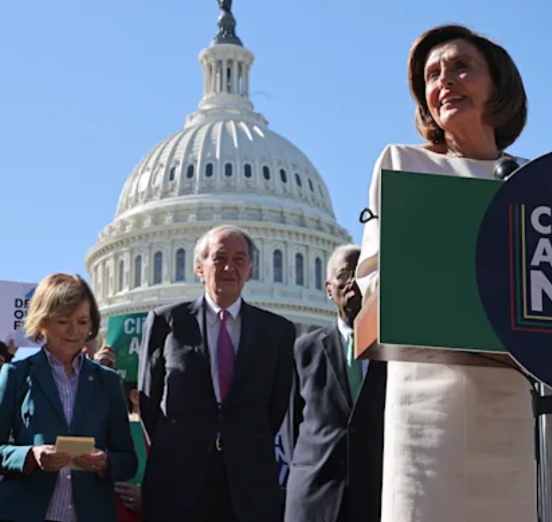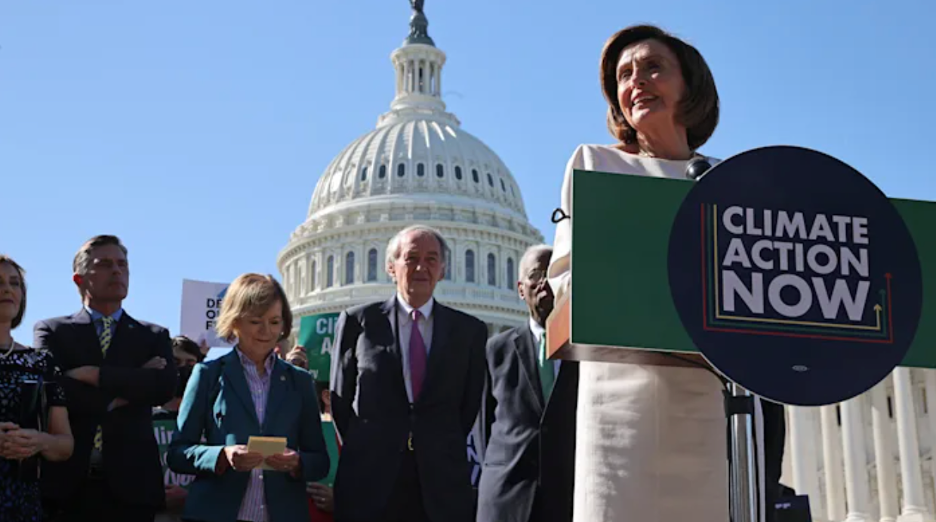Climate, Health and Equity Brief
House Votes to Build Back Better
November 23, 2021

The Climate, Health & Equity Brief is GMMB’s take on the week’s news on the current impacts of climate change. If you haven’t subscribed yet, you can do so by clicking here.
Hot Topic: Investment. The U.S. took two major steps forward on tackling the climate crisis this week. On Monday, President Biden signed into law the $1.2 trillion bipartisan infrastructure bill that included the nation’s largest-ever investment in climate change mitigation and environmental justice initiatives. And today, the House passed the follow-on $2 trillion Build Back Better Act, which allocates an additional $550 billion in climate funding—including more than $300 billion in tax incentives to encourage companies and consumers to go green.
The measure makes critical investments in wildfire reduction, coastal resilience, alternative-fuel vehicles and clean energy technology research, and creates a Climate Conservation Corps that will employ hundreds of thousands of young people in efforts to restore carbon-capturing forests and wetlands. Notably, the bill also aims to raise more than $100 billion from fossil fuel companies—namely by closing a tax loophole, reinstating lapsed taxes, increasing fees for fossil fuel leases and placing a fee on methane leaks.
Analyses by independent experts underscore how significant this legislative action can be. Ultimate passage of the Build Back Better Act has the potential to reduce annual carbon dioxide emissions in the U.S. by about a sixth. However, the legislation faces an uncertain road ahead as it moves to the Senate, where it will require the full support of Democrats in the face of united opposition among Republicans.
— Matt & Traci, GMMB
Programming Note: The Brief will be on hiatus for the Thanksgiving holiday, returning to your inbox in two weeks. We wish you all a joyful, safe and restful holiday break.
Human Health
New research found that keeping global temperature increases under 2°C (3.6°F) through the end of the century would prevent 4.5 million premature deaths, 1.4 million hospitalizations and emergency room visits, and 1.7 million incidences of dementia. (NASA)
A new investigation revealed that air and water pollution in western Pennsylvania is having strongly correlated mental health impacts, altering cerebral functions and leading to further mental illnesses, particularly among children and communities of color in the region. (Environmental Health News)
After two weeks of dense smog in Delhi and its suburbs, the Indian government directed six coal-fired power plants to temporarily cease operations after the air quality index reached hazardous levels. (Bloomberg)
Politics & Economy
House Democrats passed President Biden’s $2 trillion Build Back Better spending package Friday morning—including more than $550 billion in funding for climate mitigation, green energy promotion and EV incentives—but the bill now faces a difficult path in the Senate. (The Washington Post)
The $1.2 trillion bipartisan infrastructure bill signed by President Biden on Monday designates $50 billion for climate resilience, $65 billion for clean energy and grid investments, and $7.5 billion for EV charging stations nationwide. (CNBC)
New polling shows that the percentage of Americans who believe climate change to be a serious problem remains largely unchanged in the past six years while the climate crisis has worsened, but the partisan divide on the issue has widened. (The Washington Post)
The Biden administration submitted the 2016 Kigali Amendment to the 1987 Montreal Protocol—which mandates a reduction of hydrofluorocarbons by more than 80 percent by 2050—to the Senate for approval, after the Trump administration declined to sign. (The Washington Post)
Due to a legal setback, the federal government launched an auction for the largest-ever sale of oil and gas drilling leases in the Gulf of Mexico, outraging many who say the Biden administration is damaging US credibility on climate and going back on his own executive order to put an end to offshore drilling. (The Guardian)
Combating the climate crisis is a moral imperative.”
-House Speaker Nancy Pelosi (D-CA)
Equity
After years of tribal requests, President Biden announced he will block gas leasing around Chaco Canyon in New Mexico, one of the oldest and most culturally significant Native American sites in the U.S. (The New York Times)
Planetary Health
A portion of a vital reserve in the Amazon rainforest intended to be protected from deforestation has instead been illegally clear cut to make way for more than 600 cattle ranches that supply beef and leather seats for luxury vehicles to the United States and other wealthy nations. (The New York Times)
Action
More than 300 hotel chains, tourism boards, tour operators and others in the travel industry signed the Glasgow Declaration on Climate Action in Tourism, committing to reducing carbon emissions 50 percent by 2030 and reaching net-zero by 2050. (The New York Times)
Kicker
Up for a challenge? Try out this virtual simulation to see if you can successfully get a city to achieve net-zero emissions.
The GMMB Climate, Health & Equity Brief would not be possible without the contributions of the larger GMMB California team—Aaron Benavides, Elke Cortes and Stefana Simonetto. Feedback on the Brief is welcome and encouraged and should be sent to CHandEBrief@gmmb.com.






